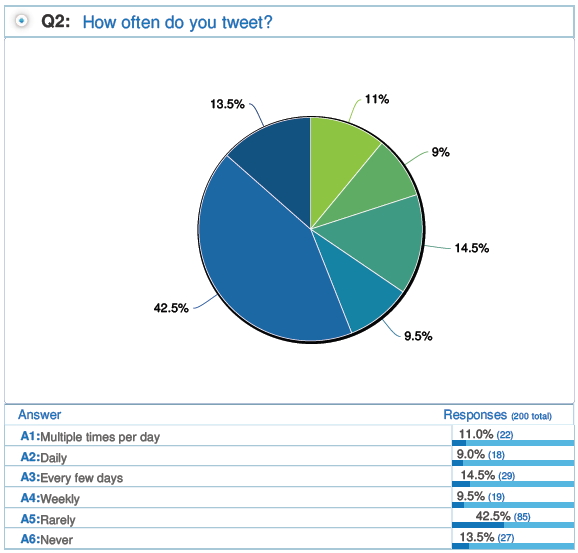It's no secret that most Twitter users don't tweet. Just the other day Ask Your Target Market (AYTM) released survey of 200 Twitter users in U.S. According to the survey, only 20% of Twitter users make at least one tweet a day, and vast majority of users either don't tweet at all (13.5%) or rarely tweet (42.5%). If you look closely at daily active users, only about half of users are making multiple tweets a day. That means most of traffic is generated by only about 10% of users.
When you consider asymmetric nature of Twitter (following without becoming friend), it's understandable why users think of Twitter different from Facebook. With Twitter's 140 character limit and public-by-default sharing mode, it's no wonder Twitter is considered as media headline subscription network rather than personal social network. By design Twitter attracts more users who are in search of publicity and mass marketing (also known as spamming). Twitter's loose attitude towards pseudonyms have also made it easier target for spammers.
Earlier today Twitter filed lawsuit against the most flagrant spam tool makers: TweetAttacks, TweetAdder, TweetBuddy, Garland Harries, and James Lucero. Twitter's intent is clear. They want to reduce spams. But what is not clear is their plan to encourage 80% of Twitter users to tweet more.
I am disappointed with the announcement. Not because I condone spamming, but because it's not the most pressing issue facing Twitter.
Reducing spam does not incentivize users to tweet more and generate more signal. It is important to rate limit the number of tweets that can be sent via API to maintain minimum service availability for all. But once that basic protection is working well (in fact Twitter is the one who has the most lax rate limit compared to Facebook and LinkedIn), Twitter might have done better by focusing on why people are not sending tweets.
Fact is that Twitter users already have problem of filtering useful tweets out of all their timeline. It's not because of spammer filling up the timeline. It's because there is no good way to filter tweets to glean signals out of noises in the timeline.
As Facebook makes headway to become socially curated news channel, Twitter needs to start focusing on improving users experience. What Twitter needs is innovation and taking more risk.
 |
| AYTM released survey data of 200 Twitter users from March; but this is not news, it's been well known fact. |
When you consider asymmetric nature of Twitter (following without becoming friend), it's understandable why users think of Twitter different from Facebook. With Twitter's 140 character limit and public-by-default sharing mode, it's no wonder Twitter is considered as media headline subscription network rather than personal social network. By design Twitter attracts more users who are in search of publicity and mass marketing (also known as spamming). Twitter's loose attitude towards pseudonyms have also made it easier target for spammers.
Earlier today Twitter filed lawsuit against the most flagrant spam tool makers: TweetAttacks, TweetAdder, TweetBuddy, Garland Harries, and James Lucero. Twitter's intent is clear. They want to reduce spams. But what is not clear is their plan to encourage 80% of Twitter users to tweet more.
I am disappointed with the announcement. Not because I condone spamming, but because it's not the most pressing issue facing Twitter.
Reducing spam does not incentivize users to tweet more and generate more signal. It is important to rate limit the number of tweets that can be sent via API to maintain minimum service availability for all. But once that basic protection is working well (in fact Twitter is the one who has the most lax rate limit compared to Facebook and LinkedIn), Twitter might have done better by focusing on why people are not sending tweets.
Fact is that Twitter users already have problem of filtering useful tweets out of all their timeline. It's not because of spammer filling up the timeline. It's because there is no good way to filter tweets to glean signals out of noises in the timeline.
As Facebook makes headway to become socially curated news channel, Twitter needs to start focusing on improving users experience. What Twitter needs is innovation and taking more risk.
No comments:
Post a Comment